Topic:
Content Marketing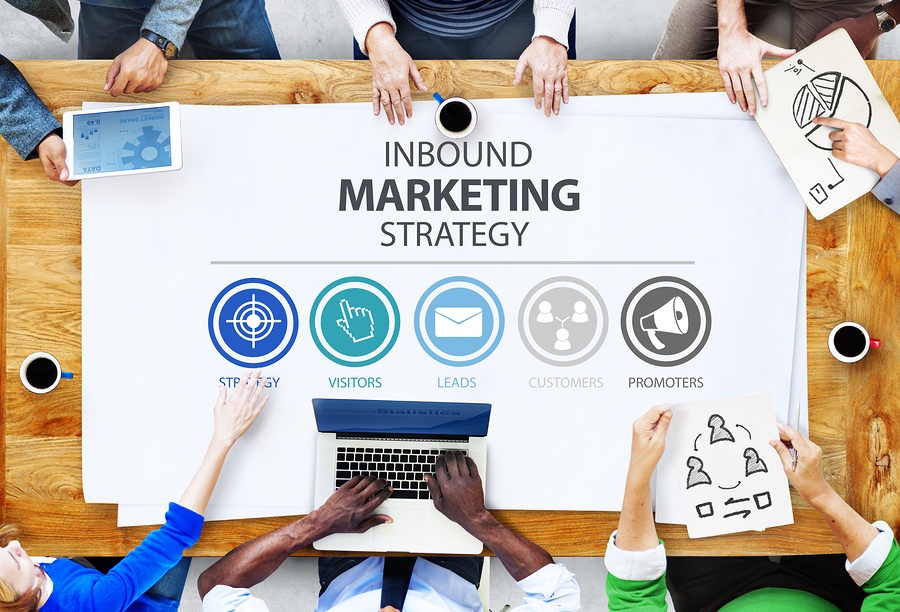
There are many opinions about how to develop the perfect marketing strategy, backed by complex formulations, algorithms, and more technology than a non-technical business professional ever wants to look at. Fortunately, the concept of inbound marketing is really not that complicated. The best approach is simply a sales-oriented marketing strategy (one that is defined by a successful sales process for each buyer persona) that is based on and driven by data and then applied through the use of techniques that follow a proven structure of “attract, convert, close, and delight.” Let's take a look at how you can create an inbound marketing strategy that wins every time.
In the past, traditional outbound marketing tactics such as placing ads in print magazines and other online techniques like buying email lists which create poor engagement and can risk your company as being marked as a spammer results in businesses who constantly struggle for attention. Prospects have learned to ignore these blatant, in-your-face intrusions into their private and workspace. In contrast, inbound marketing is inclusive and helps your customers easily find you through a variety of widely-used online outlets such as website blogs, search engines, social media, and other online platforms.
Inbound marketers attract the attention of their potential customers by providing them with meaningful content and information that can help them meet their goals and solve their problems. By providing desired customers with content that offers creative solutions, answers questions, and directly meets their needs, inbound marketing can help establish a business as an authority and build strong and trusting relationships with customers.
At each stage of the sales funnel, content is used to gently guide and then convert prospects. It first attracts the attention of a prospect by expressing an understanding of their “pain” – something they perceive as a want or a need, whether it’s a product to cure an actual pain (for example, medicine for an ailment) or a figurative “pain” (“these clothes are old and ugly – I really need something new and fashionable to look my best”).
Once the prospect realizes you understand and empathize with their pain, they’ll decide to look closer at what you have to offer, at which point your content outlines your “cure” in an educational but different way than your competition. Convinced that you are the best choice, the prospect is converted to a qualified prospect for your sales team by a final piece of content that provides a compelling call to action. This proven process is central to the inbound methodology's customer-focused approach, which is why, according to HubSpot, inbound marketing delivers 54% more leads than outbound.
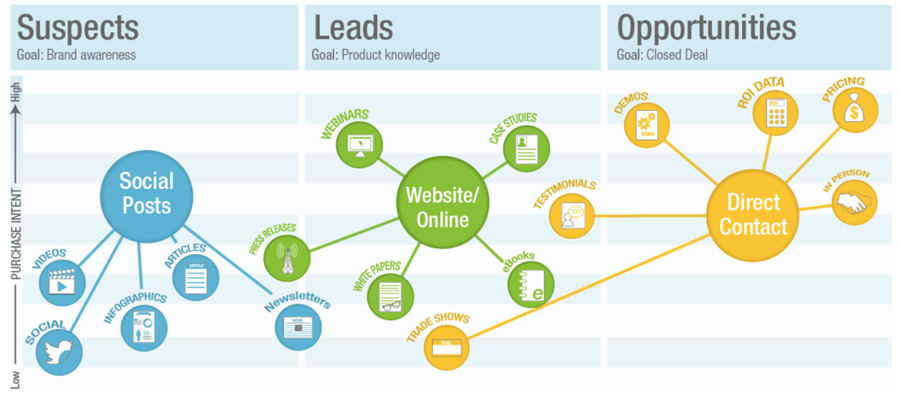
CRM platforms and marketing automation tools provide a systematic way to gather data, measure it, and analyze it to create more effective and targeted marketing initiatives.
Establishing a consistent process of “test-measure-tweak” can help fine-tune your marketing program, revealing which initiatives work, which don’t, and what aspects should be kept or discarded. Of course, to ensure that you’re gathering meaningful, actionable data, it’s important to determine what you want to accomplish and what you need to measure to help you gauge success. For example, do you want:
Each requires different metrics and analyses to generate accurate and reliable insights. Agreeing to and measuring a relevant set of metrics is fundamental to understanding the success and failure of a campaign. Using these metrics can help you determine if your inbound marketing efforts are succeeding or failing. Here are several key metrics (the 9 KPIs for inbound marketing success) that will help you measure the impact of your inbound marketing efforts.
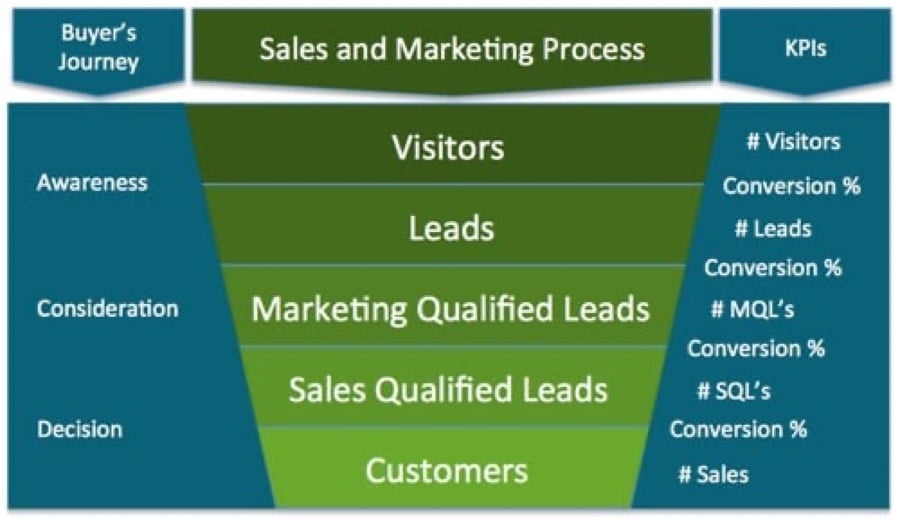
Over the years, inbound marketing has occasionally been plagued by myths. Unfortunately, sometimes these myths stop businesses from considering this form of marketing. Here are facts that dispel two of those inbound marketing myths:
Myth: Inbound marketing is just like SEO (search engine optimization).
Fact: SEO is a term used for optimizing keyword-based visitors to your website from search engines. Although SEO is an important element of any marketing program, investing in SEO without also investing in valuable new content is ineffective. On the other hand, inbound marketing is a comprehensive marketing methodology that not only draws a specific type of visitor that is highly targeted and correlated to the type of content you publish, but it also turns them into warm leads for sales and ultimately increases the conversion rate of those leads into sales. But consider this topic is not an either-or proposition. When creating new content, it is imperative that when published it is optimized for search.
Myth: One person, such as your marketing director or a manager can handle all of the inbound marketing tasks.
Fact: Inbound marketing is usually a team effort since it requires a variety of skill sets. Establishing and executing a successful inbound marketing campaign frequently involves SEO, content creation, landing page design, strategic planning, analytics analysis, video production, and other business talents. As with any methodology, there is no substitute for experience. Find a partner who has experience with the Inbound Marketing methodology and resources to ensure your success.
Myth: I do not like to send emails to prospects because I do not like receiving them.
Fact: It is important to not consider your preferences and biases to be the same as all of the people who represent your target market. It is important to share the valuable content you are creating with your prospects. By doing so, this steady drip of information keeps your company top-of-mind for the time when they are ready to buy. As long as the contacts in your email database have opted-in to receiving email, especially if that permission to communicate comes from downloading one of your eBooks, then they are interested in your company and content. We know this works because we measure email open rates and click-through rates to determine if our emails are effective.
Myth: No one is going to give you their name and email address to download an eBook.
Fact: So long as the content you are creating and the visitors to your website are well correlated with your ideal customer then they will download your eBooks and give you their contact information in exchange for it. We typically see 20% to 45% conversion rates for the awareness stage of the buyer’s journey eBooks, and that is even when we provide them all of the content on a web page and then offer a PDF for them to download. They can see all of the content before providing their information. This approach creates trust and also ensures the contact is someone who values your solution.
There are several reasons that inbound marketing, or any marketing approach, can fail. For example, one of the inbound conversion secrets that can lead to a successful campaign is to build organic search traffic by utilizing high-quality content geared toward potential customers. Your inbound marketing efforts can fall short if you fail to create the best possible content and blogs and don’t invest the time to ensure they are properly optimized for search engines. Any type of content that you create should be engaging, deliver value, offer unique selling points and it must be written for your customers rather than search engines.
Another reason for failure can occur if your business does not properly identify and understand the persona of the customers who need or are ready to review your products or services. Since buyer personas are the foundation of any inbound marketing campaign strategy, you must understand their distinguishing qualities, how they think, what they do, and their challenges. If your campaign activities do not align with the persona, your blogs, e-books, emails and other types of content and interactions will fail to engage them. It is like throwing spaghetti against a wall and seeing what sticks. The same is true for content. Creating a set of high-quality content that aligns with your prospect's needs will attract them and convert them into leads.
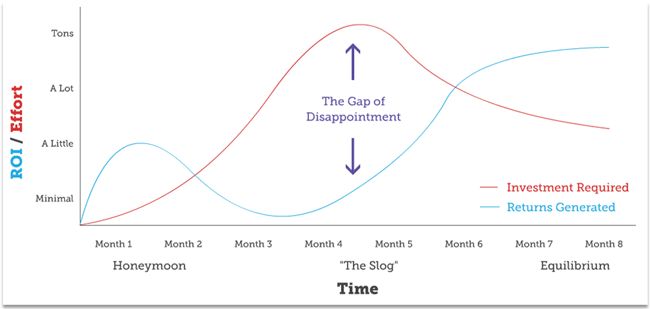
Hiring inbound marketing consulting specialists for a long-term relationship is a significant investment. To feel comfortable in outsourcing this area of your business, it is important to know that what you gain in expertise, efficiency and results is worth your money. The following are five things that you should expect from an inbound marketing consultant before hiring one:
A common risk when hiring an outside specialist is that the firm has a controlling approach to performing its role. A mutually-beneficial long-term relationship with a consultant is driven by respect for each other's needs and position.
A prospective consultant should outline their process for building a strategy. They should spend time getting to know you, your company, its culture, its goals, and its audience. Often, the tone for collaboration is established early on when leaders of the consulting firm invite you for a get-to-know-you session. During this initial get-together, you have the chance to explain what your company is about, outline what you hope to accomplish with inbound marketing, and discuss how inbound marketing integrates into your marketing plan.
In response, a high-quality consultant should be able to tell you how they align their inbound marketing strategy and execution with your vision, goals, and market. You should feel entirely comfortable that the relationship is a partnership, or union, before agreeing to do business.
Mediocre or average inbound marketing firms can develop content, share it and help you distribute it. However, if the consultant intends to perform these activities in a one-size-fits-all manner, you miss out on a more customized approach offered by the best inbound marketing experts.
When you develop a marketing plan for your business, it typically takes care to develop a coordinated and effective strategy. Thus, it is reasonable for you to expect that a specialist will come in with the skills and experience with your industry and invest time to fine-tune the strategy with your business's ideal and most effective sales process. To succeed with inbound marketing, the consultant must help you clearly identify the content types and delivery mechanisms to optimize message delivery and the conversion rates from visitors to leads and ultimately into customers.
An elite inbound marketing consultant needs deep expertise in the relationship between sales and marketing. The central function of inbound marketing is to attract visitors to your website or content, and then to convert them into readers, users or buyers. By definition, you must have content designed to drive people to your site, where your landing pages and other lead generation mechanisms lead to high conversion ratios.
The inbound marketer must also understand how your sales team takes leads, qualifies and nurtures them, and then works through the sales process to eventually close deals. Highly informative and persuasive content goes a long way in arming a prospect with a pre-contact perspective that enables more effective selling.
Your inbound marketing consultant needs to help you build buyer personas as well. A buyer persona is a sketch or detailed overview of the traits, interests, and buying behaviors of a target market segment. Creating buyer personas is essential to developing and distributing content that is the most relevant and useful to targeted readers, according to the Content Marketing Institute.
While you may have additional goals, the most common and compelling goal of inbound marketing is to generate leads for your business. An experienced inbound marketing consultant understands how to set goals that make sense for your company and its current circumstances. Challenging, attainable, specific, and measurable goals are vital to know whether your content marketing consultant's strategy is working, and what adjustments to make as you move forward.
Based on this critical goal, the ultimate must-have from a consultant is a clear demonstration of growth in generating qualified leads. A veteran consulting firm can offer you quantified data on leads generated for typical clients. As you build the partnership, the data you gather tells the story. If you don't hit target goals during the initial months and quarters, the consultant should have certain strategies for improvement. Over time, consistent delivery of qualified leads and an improved conversion rate speak to a healthy return on your investment.
Naturally, you want your consultant to take a customer-first approach in the way they help you build your marketing strategy. Beyond that, a customer-centric approach helps in the retention portion of inbound marketing. After you get visitors to your site, educational content helps them make informed buying decisions.
Additionally, your strategy should address how to interact with customers after a purchase. A consultant with a customer-centric mindset helps you connect your customer relationship management activities with content systems to optimize post-purchase communication. When retention marketing is implemented efficiently, a customer feels valued after their purchase and is more open to add-on sales.
Every marketing strategy starts with a clearly defined set of goals that align with the needs of your buyer personas. However, establishing your goals from the outset is especially important for inbound marketing, not least because it’s relatively complicated to measure performance. It is more helpful if these buyer persona goals are aligned with triggers that cause your ideal buyer to purchase your product or service.
Everything starts with measuring your current baseline sales and the performance of your existing marketing campaigns. To do this, you’ll need to closely examine every step of the customer journey from the moment a prospect becomes aware of your business to the moment they make a purchase or decide to look elsewhere.
By identifying the main areas in need of improvement, you’ll be able to define the elements of your inbound marketing strategy. At this stage, you should avoid prioritizing marketing metrics such as clicks, social media followers, and page visitors. Instead, it’s much more valuable to focus on business metrics that directly translate into performance, such as ROI, leads, customers, and revenue. It is also extremely valuable to develop each strategy for a particular buyer persona and the funnel (journey) of information you would like them to experience during their journey to becoming a customer.
Once you’ve established your goals, you’ll want to outline the customer journey. Any inbound marketing strategy needs to be perfectly tailored to the customer journey as such that the two work together in a perfect symbiotic relationship. In other words, your strategy needs to be aligned with your prospect’s journey for information.
In the context of B2B markets, potential customers tend to prioritize trust and reliability above all else. They want and expect genuine value before they will even consider parting with any money. If they’re going to engage with your content, such as by sharing it on social media or signing up to your email newsletters, they need a reason to do so.
The buyer’s journey begins when a prospect first hears about your business, so you’re going to want to make sure they get a great first impression. This is where the importance of creating a solid content strategy comes in. By developing quality content that educates prospects and gives them a feeling they’ve learned something new or found a way to solve their problems, you’ll be able to raise brand awareness while also differentiating and defining the unique characteristics of your brand. A simple way to think about this point is to provide insight with each bit of information you provide to them along the way.
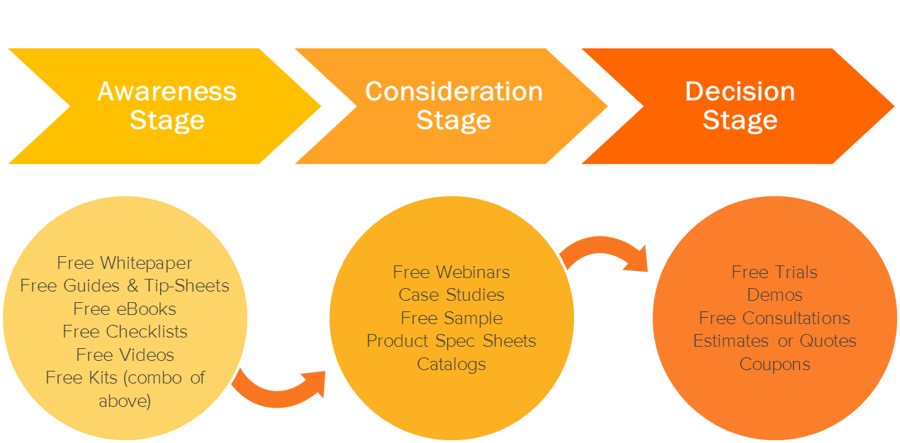
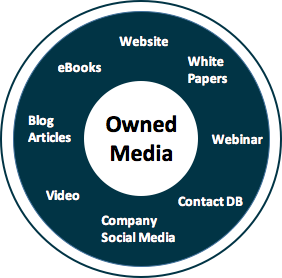
Inbound marketing is largely about creating a content strategy that gets people talking about your company and, effectively, doing a portion of your advertising for you. It’s about building meaningful relationships by giving away something for free in the form of quality content across a wide variety of formats from blog posts to social media updates to infographics and more.
Motivating your prospects to consume content throughout the buyer journey from initial interest to long after they’ve made a purchase is a critical element of any inbound marketing strategy. However, it doesn’t stop there. Although you have complete control over the information that your company publishes on the Web and elsewhere, it’s ultimately earned content that tends to be the most powerful.
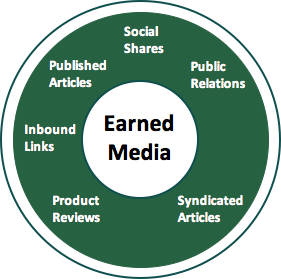 Earned content refers to information about your company published by third parties. These days, anyone can leave public feedback about any business they want in the form of ratings and reviews, and other user-generated content. Because businesses no longer have the same degree of direct control over their reputations as they once did, it’s imperative that they be transparent and responsive.
Earned content refers to information about your company published by third parties. These days, anyone can leave public feedback about any business they want in the form of ratings and reviews, and other user-generated content. Because businesses no longer have the same degree of direct control over their reputations as they once did, it’s imperative that they be transparent and responsive.
Unsurprisingly, positive user-generated content is earned by being a great business with excellent customer service and a solid value proposition among other factors. However, the importance of great content should never be underestimated either, since it’s what gets people talking about your business in the first place. On the other hand, without a strategy in place, you’ll fail to reach out to the right audience, in which case your content will fade into obscurity or, worse, lead to negative feedback.
Consider the following important elements when developing your inbound marketing strategy:
If you’re looking for some of the best inbound marketing strategy examples and templates, check out the inbound marketing strategy page on this site for one of the most popular places to get started. This guide to inbound marketing is just one of the many resources we have available to you. Download the content strategy data sheet to learn about how Bristol Strategy helps businesses create a strategy that attracts, converts, closes, and delights ideal prospects.
If you are new to Inbound Marketing, please download the Inbound Marketing Guide for Newbies. If you are ready to have a discussion, then please request an inbound marketing assessment. We would love to hear from you.
Bristol Strategy is a full funnel inbound marketing agency and inbound sales agency offering the full complement of Inbound Marketing services that enable our clients to surpass their business objectives by transforming the way they engage with their buyer online. Reach out to us to learn more about how our experience and capabilities can help your business grow.
Ask us about our unique approach that creates a full-funnel "inbound" engagement model for your business that attracts and converts digitally engaged prospects.